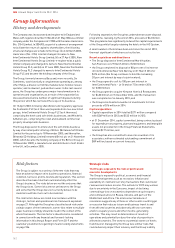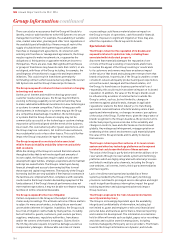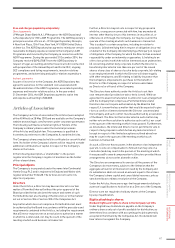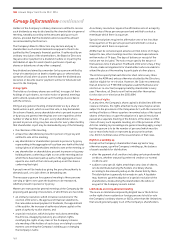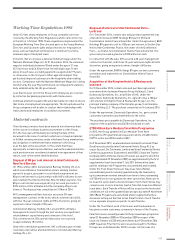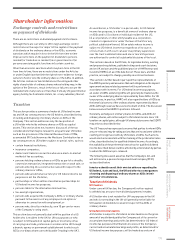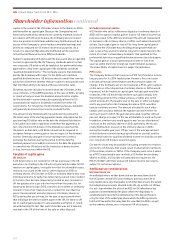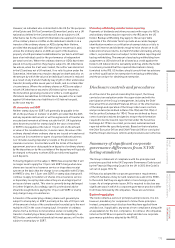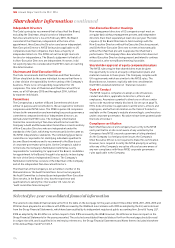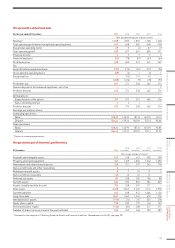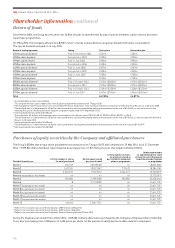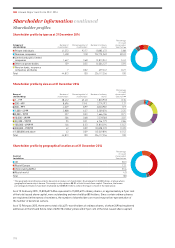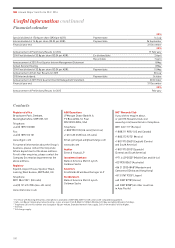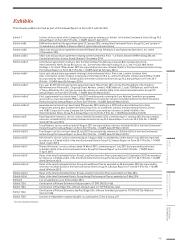Holiday Inn 2014 Annual Report Download - page 173
Download and view the complete annual report
Please find page 173 of the 2014 Holiday Inn annual report below. You can navigate through the pages in the report by either clicking on the pages listed below, or by using the keyword search tool below to find specific information within the annual report.
Exchange controls and restrictions
on payment of dividends
There are no restrictions on dividend payments to US citizens.
Although there are currently no UK foreign exchange control
restrictions on the export or import of the capital or the payment
of dividends on the ordinary shares or the ADSs, economic
sanctions which may be in force in the UK from time to time
impose restrictions on the payment of dividends to persons
resident (or treated as so resident) in or governments of (or
persons exercising public functions in) certain countries.
Other than economic sanctions which may be in force in the UK
from time to time, there are no restrictions under the Articles
or under English law that limit the right of non-resident or foreign
owners to hold or vote the ordinary shares or the ADSs. In addition,
the Articles contain certain limitations on the voting and other
rights of any holder of ordinary shares whose holding may, in the
opinion of the Directors, result in the loss or failure to secure the
reinstatement of any licence or franchise from any US governmental
agency held by Six Continents Hotels, Inc. or any subsidiary thereof.
Taxation
This section provides a summary of material US federal income
tax and UK tax consequences to the US holders, described below,
of owning and disposing of ordinary shares or ADSs of the
Company. This section addresses only the tax position of
a US holder who holds ordinary shares or ADSs as capital
assets. This section does not, however, discuss all of the tax
considerations that may be relevant to any particular US holder,
such as the provisions of the Internal Revenue Code of 1986,
as amended (IR Code) known as the Medicare Contribution tax or
tax consequences to US holders subject to special rules, such as:
• certain financial institutions;
• insurance companies;
• dealers and traders in securities who use a mark-to-market
method of tax accounting;
• persons holding ordinary shares or ADSs as part of a straddle,
conversion transaction, integrated transaction or wash sale, or
persons entering into a constructive sale with respect to the
ordinary shares or ADSs;
• persons whose functional currency for US federal income tax
purposes is not the US dollar;
• partnerships or other entities classified as partnerships for
US federal income tax purposes;
• persons liable for the alternative minimum tax;
• tax-exempt organisations;
• persons who acquired the Company’s ADSs or ordinary shares
pursuant to the exercise of any employee stock option or
otherwise in connection with employment; or
• persons who, directly or indirectly, own 10 per cent or more
of the Company’s voting stock.
This section does not generally deal with the position of a US
holder who is resident in the UK for UK tax purposes or who
is subject to UK taxation on capital gains or income by virtue
of carrying on a trade, profession or vocation in the UK through
a branch, agency or permanent establishment to which such
ADSs or ordinary shares are attributable (‘trading in the UK’).
As used herein, a ‘US holder’ is a person who, for US federal
income tax purposes, is a beneficial owner of ordinary shares
or ADSs and is: (i) a citizen or individual resident of the US;
(ii) a corporation, or other entity taxable as a corporation,
created or organised in or under the laws of the US or any
political subdivision thereof; (iii) an estate whose income is
subject to US federal income tax regardless of its source;
or (iv) a trust, if a US court can exercise primary supervision
over the trust’s administration and one or more US persons
are authorised to control all substantial decisions of the trust.
This section is based on the IR Code, its legislative history, existing
and proposed regulations, published rulings and court decisions,
and on UK tax laws and the published practice of HM Revenue and
Customs (HMRC), all as of the date hereof. These laws, and that
practice, are subject to change, possibly on a retroactive basis.
This section is further based in part upon the representations of
the ADR Depositary and assumes that each obligation in the deposit
agreement and any related agreement will be performed in
accordance with its terms. For US federal income tax purposes,
an owner of ADRs evidencing ADSs will generally be treated as the
owner of the underlying shares represented by those ADSs. For UK
tax purposes, in practice, HMRC will also regard holders of ADSs as
the beneficial owners of the ordinary shares represented by those
ADSs (although case law has cast some doubt on this). The discussion
below assumes that HMRC’s position is followed.
Generally, exchanges of ordinary shares for ADSs, and ADSs for
ordinary shares, will not be subject to US federal income tax or UK
taxation on capital gains, although UK stamp duty reserve tax (SDRT)
may arise as described below.
The US Treasury has expressed concerns that parties to whom ADRs
are pre-released may be taking actions that are inconsistent with the
claiming of foreign tax credits by US holders of ADSs. Such actions
would also be inconsistent with the claiming of the preferential rates
of tax, described below, for qualified dividend income. Accordingly,
the availability of the preferential rates of tax for qualified dividend
income described below could be affected by actions taken by parties
to whom the ADRs are pre-released.
The following discussion assumes that the Company is not, and
will not become, a passive foreign investment company (PFIC),
as described below.
Investors should consult their own tax advisors regarding the
US federal, state and local, the UK and other tax consequences
of owning and disposing of ordinary shares or ADSs in their
particular circumstances.
Taxation of dividends
UK taxation
Under current UK tax law, the Company will not be required
to withhold tax at source from dividend payments it makes.
A US holder who is not resident for UK tax purposes in the UK
and who is not trading in the UK will generally not be liable for
UK taxation on dividends received in respect of the ADSs or
ordinary shares.
US federal income taxation
A US holder is subject to US federal income taxation on the gross
amount of any dividend paid by the Company out of its current or
accumulated earnings and profits (as determined for US federal
income tax purposes). Distributions in excess of the Company’s
current and accumulated earnings and profits, as determined for
US federal income tax purposes, will be treated as a return of
Shareholder information
171
STRATEGIC REPORT GOVERNANCE
GROUP
FINANCIAL STATEMENTS
PARENT COMPANY
FINANCIAL STATEMENTS
ADDITIONAL
INFORMATION



